J Korean Soc Transplant.
2010 Mar;24(1):1-3. 10.4285/jkstn.2010.24.1.1.
The Role of NGO in Deceased Organ Transplantation
- Affiliations
-
- 1Department of Surgery, Yonsei University College of Medicine, Seoul, Korea. soonkim@yuhs.ac
- 2Department of Surgery, Seoul National University College of Medicine, Seoul, Korea.
- 3Department of Medicine, Eulji University School of Medicine, Daejeon, Korea.
- 4Department of Medicine, Seoul National University College of Medicine, Seoul, Korea.
- 5Department of Surgery, Kyemyung University School of Medicine, Daegu, Korea.
- KMID: 2202216
- DOI: http://doi.org/10.4285/jkstn.2010.24.1.1
Abstract
- Solid organ transplantations give end stage organ failure patients new, healthy and normal lives and have them return to their families, friends and communities. But, there has been a donor organ shortage and it has been considered a major obstacle. A national report in 2009 showed a severe disparity between the annual numbers of organ donors (1,787) and the number of patients (12,235) on the deceased donor waiting list. In terms of donor action, and to meet the demands of organs for transplantation, we need to educate the public on the need for organs, eye and tissue donations, and we need to motivate the public to make an actionable donor designation. The unification of non-governmental organization (NGO) is necessary to educate the public about organ, eye and tissue donations and to avoid duplication of effort.
MeSH Terms
Figure
Cited by 2 articles
-
Management of brain-dead donors in Korea
Jin Joo
J Korean Med Assoc. 2014;57(2):137-142. doi: 10.5124/jkma.2014.57.2.137.Operational and Regulatory System Requirements for Pursuing Self-sufficiency in Deceased Donor Organ Transplantation Program in Korea
Myung-Gyu Kim, Cheol Jeong Jong, Eun Jin Cho, Ha Huh Kyu, Jaeseok Yang, Im Byeon Nyeon, Sook Yu Jin, Tae Bang Ki, Heoung Soo Chung, Won Ha Jong, Il Kim Soon, Hyun Cho Won, Curie Ahn
J Korean Soc Transplant. 2010;24(3):147-158. doi: 10.4285/jkstn.2010.24.3.147.
- Full Text Links
- Actions
-
Cited
- CITED
-
- Close
- Share
- Similar articles
-
- Current Status of Deceased Donor Organ Recovery and Sharing in Korea
- Activation Policy for Brain-dead Organ Donation
- Assessment of hospital deceased organ donation potential at St. Luke’s Medical Center–Quezon City
- Desensitization in HLA Incompatible Transplantation
- Current Status of Deceased Donor Liver Transplantation for Alcoholic Liver Disease in Korea in MELD Era


